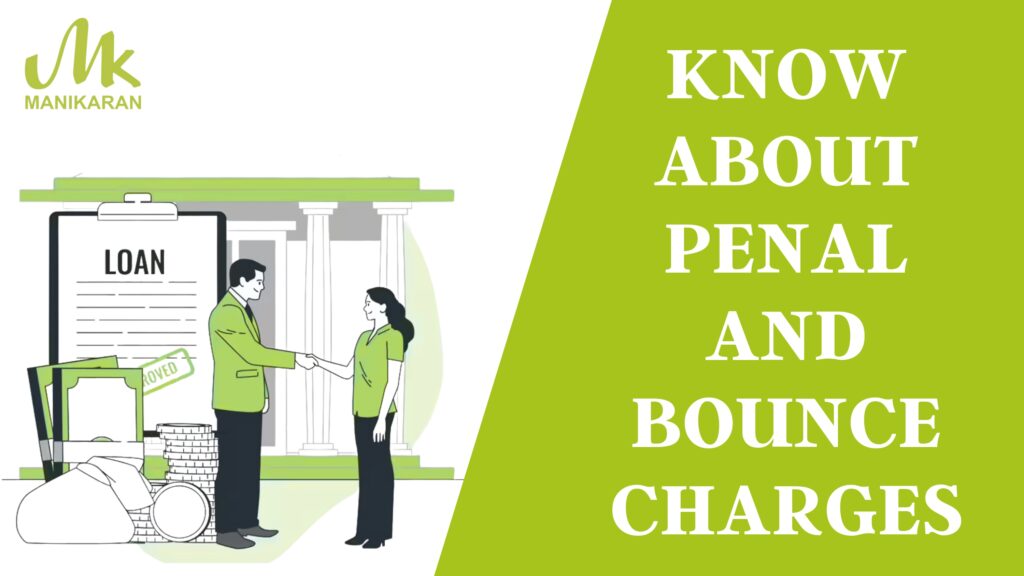Missed a Loan Payment? Know the Bounce & Penal Charges You’ll Face

Missed a Loan Payment? Know the Bounce & Penal Charges You’ll Face
Sometimes life goes beyond our control. There could be a sudden cost, a late payment, or simply a due date that you forgot. Losing track of a loan payment is becoming increasingly commonplace. However, Rubm Despite being a common phenomenon, the consequences of a missed or delayed payment are significant especially when it comes to EMIs. There are both bounce charges and penal charges, not to mention the larger problem of poor credit score that could bring you unexpected financial consequences during the loan repayment period.
Now more than ever, it is pertinent that you understand these charges and more importantly the techniques to avoid them. This quick, practical guide is all you need to offset these consequences and save you the hassle later down the line when you need to repay.
What Consequences You Face When You Skip an EMI Payment?
From the moment you receive a personal loan, the loan must be repaid in a timely manner, and this is usually done in monthly installments known as EMIs. Most borrowers set up auto-debit instructions, so the EMI is deducted from their bank account on a specific date each month. But if the bank attempts to collect the EMI and your account doesn’t have sufficient funds, the payment fails. This is called an EMI bounce.
What many of us fail to recognize is the fact that this single transaction which has failed will invoke bounce charges. These are imposed by your lender as a result of the failed payment attempt. As a result of your lender’s policy, these charges may differ, however, in most cases this will fall in the range of ₹300 to ₹750 or even more. Furthermore, your bank has the right to charge you with cheque bounce or ECS failure fees. This means, in effect, you are paying a fine on two fronts; your lender and your bank, simply because you do not have funds at the right time.
Understanding bounce charges
Bounce charges can be hard to miss when they are there, but they can also be hard to explain. They are explained in detail in the fine print of your loan agreement: the area most borrowers overlook and, thus, bounce charges are also missed. All bounce charges will apply each time your EMI auto-debit fails on your loan, regardless of whether you pay your EMI the following day or a week later. What makes bounce charges so disturbing is how quickly they ramp up. Missed an EMI this month? For starters, that’s ₹500. Missed an EMI next month? There is another ₹500 on your bill. Over time, the amount you have to come up with is only nominally big, yet potentially devastating if you are in a bad financial situation.
Now Comes the Penal Charge
Bounce charges are just one side of the coin! If you don’t clear the missed EMI quickly, there may be something even more serious in the offing — penal charges, known as penal interest. Penal interest is used by lenders as an additional interest rate on top of your regular EMI when you miss your payment and its past due date. So, if your loan interest rate is 12% per annum, the lender might decide to impose an additional penal interest of between 2–4% on the unaccounted amount. In fact, this interest does not replace your EMI; it, however, will simply add to your EMI value. And, importantly, the longer you leave it, the worse things will become, especially since unlike bounce charges, which you only pay once per failed transaction, penal charges will continually accumulate until you settle the dues. This is precisely why just missing an EMI should result in more penalties than it seems. You pay not just the late fee — but now pay interest on unpaid interest. In the long run, this can elongate your repayment like chewing gum and exaggerate the loan price.
Why These Charges Are More Important Than You May Think
Most people only think about the monthly EMI when obtaining a loan. What they often don’t think about is how charges for penalties can increase that amount if they miss repayments. A €500 bounce fee and a 3% penal interest on a delayed EMI of €10,000 means you are paying much more than just that scheduled amount. Even worse, not only do these charges represent a financial hit to you; they begin to hurt your credit profile as well. Whenever you miss a loan payment, your lender notifies the credit bureau. The credit bureau assigns risk scores based on borrowers’ payment history along with their overall credit profile. For example, a single late payment represents a loss of risk score by 50 to 100 points depending on your overall profile. A lower score not only hurts you with your current loan but can also affect your future credit opportunities like credit cards, auto loans or a home loan. So as you can see, the “cost” of missing an EMI loan is not limited to the bounce penalty — it affects your financial health and capacity to borrow in the future.
Is There an Option to Have these Charges Reversed?
Generally, lenders are inflexible when it comes to recovering bounced and penalty charges. The penalty charges are built into your loan, and there isn’t usually any wiggle room once they are in play. If this is your first missed payment and you have paid on time before this incident, you may have an opportunity. Contact your lender right away, explain your circumstances honestly, and request for a waiver on this one-time missed payment. In some cases, the bank may be accommodating enough to remove the charges as a gesture of goodwill particularly if the missed EMI payment is cleared up immediately. But don’t rely on this every time — it is very much an exception and unlikely to be the norm. The best way to avoid missed payments/additional charges is not to miss the payment in the first place.
Long-term repercussions of missed EMIs
1 missed EMI may not appear to be significant, when your missed payment is a one-off. However, if you repeatedly miss loan repayments, the ramifications will impact you for years. Your bounce charges and penal interest will only mount, your credit score will be further depressed; and thereafter you may receive frequent reminders or recovery calls, or possibly a legal notice, from your lender. In certain circumstances, your loan may be regarded as a default account, and transferred to a recovery agency. This can lead to stress and harassment, and very long-term damage to your reputation for responsible financial conduct. Once you are on a defaulter’s list or your CIBIL report reflects a loan default, securing a loan of any kind becomes exponentially more difficult.
How you can avoid this happening again
Not bouncing cheques and not incurring penal interest is not being perfect with your financial management or banking — it is merely good preparation. Keep on top of your EMIs — have a diary or calendar system where you can arrange to be reminded a few days in advance. Constantly check your balance a day or two before it is due. The best practice is to leave a small buffer in your account so you will never have a “surprise” when your account is one dollar short or less. If you are anticipating cash flow issues — a delayed salary or an emergency is costing more money than you expected — you do not need to wait for the last minute to act. Call your lender, explain the situation, and ask if your repayment can be adjusted. Some lenders will allow for a deferment of EMI repayments or even a restructuring of loans if there is a valid reason. It is always better to act swiftly than neglect and let it become an issue.
What If You’ve Already Missed a Few Payments?
If you’re reading this because you’ve already missed one or more EMIs, don’t worry. You need to pay your dues immediately. The longer you wait, the more penalties the lender will charge you. Once you have cleared your amount in default, ask the lender to provide you with a loan statement, and check carefully what has been charged, be it bounce fees, penal interest, or otherwise. Now that you’ve paid the dues, you can now start planning for the future. Review your monthly expenses, and prioritize the payment of your loans, and refrain from unnecessary spending until your loans are once again up to date. If it feels like it is too much of a burden, you can consider applying for consolidation loans, balance transfers to a lender with better terms, etc.
Final Thoughts
Personal loans can be valuable. However, they come with responsibilities. Missing an EMI is not the end of the world — but ignoring it will lead to penalties, and therefore a longer-lasting problem. Bounce charges and penal charges are more than just an extra cost — they’re a two signs that your loan is getting ahead of you. The key — be informed and act. A little planning, an adequate enough balance, and informing your lender is all you need to avoid these unknown costs! Your financial health will be created through small and consistent commitments — and every time you make an on-time EMI you’re taking steps to improve it.

